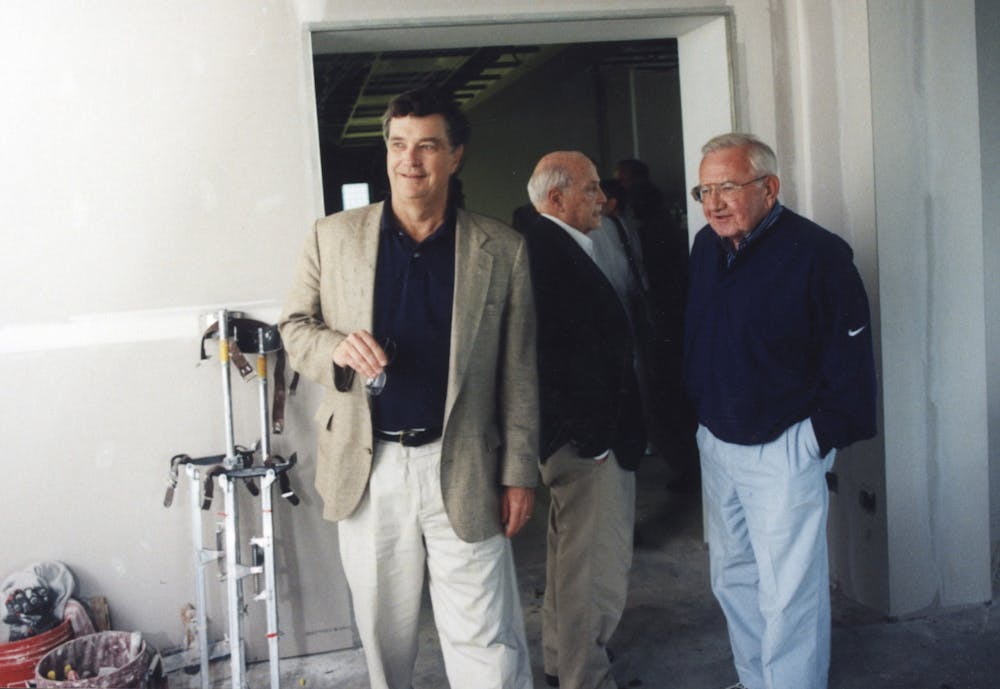Hodding Carter III ’57, a journalist, State Department spokesman during the Iran hostage crisis, and former University trustee died on May 11, after suffering complications from a series of strokes. He was 88.
Born in New Orleans and raised in Mississippi, Carter was the oldest of three sons of Hodding Carter Jr., founder of Greenville Delta Democrat-Times, an anti-segregationist newspaper that the younger Carter would eventually help run for 17 years.
Carter graduated from Princeton with a degree in the School of Public and International Affairs. He would return to his alma mater in 1983, serving as a University trustee for 15 years. He was in the position during a time that saw Princeton develop a reinvigorated focus on undergraduate teaching, as the University instituted freshman seminars and established the McGraw Center for Teaching and Learning.
“Any trustee comes to the board firstly because he or she cares passionately about Princeton," he told The Daily Princetonian in 1985. "You can't be a trustee otherwise. It takes too much time. It takes a real commitment to the institution."
Carter, who was a fervent advocate for civil rights all his life, described in a 2004 guest column in the ‘Prince’ the evolution he saw the University undergo from his time as a student.
“Today, Princeton arguably exists as a different planet in an inarguably different societal solar system,” he wrote. “So-called minorities are present in roughly the same numbers as the population at large. Women now approach numerical parity. Gays and lesbians, out of the closet, are never going back.”
After Princeton, Carter served two years in the Marine Corps, before becoming editor and publisher of his family’s newspaper. In the role, Carter vocalized his opposition for the segregationist policies of the South. His father did the same before him, winning a Pulitzer Prize in 1946 for a group of articles on racial, religious, and economic intolerance. The younger Carter would pen around 6,000 editorials in his 17 years at the paper.
Carter would wade more directly into political waters as co-chair of the Loyalist Democrats, a desegregated group of delegates that replaced the all-White Regular Democrats as Mississippi’s delegates for the first time at the 1968 Democratic National Convention.
Carter went on to do campaign work for Jimmy Carter — to whom he had no relation — before being tapped as assistant secretary of state for public affairs and State Department Spokesman.
It was in this latter role that Carter became familiar to a national audience. Nov. 1979 brought the Iran hostage crisis, and for eight months Carter would frequently deliver updates and wrangle with the press. He was known to be tough, describing the briefing as a “form of ritualized combat” to The Washington Post in 1980.
Carter would also gain notoriety for his southern witticisms. When Sen. Edward M. Kennedy (D-Mass.) criticized President Carter’s decision to admit the Shah of Iran into the United States, Hodding Carter remarked at a lecture in Princeton, “I am not one to teach a master politician how to suck eggs, but I think that is a very stupid thing to do.”
After resigning from the State Department in protest of the failed military rescue of the hostages, he worked as a columnist and broadcast journalist at ABC, BBC, NBC, CNN, and PBS. He was a vocal critic of President Reagan’s policies during the 1980s. Carter would win four Emmy Awards and the Edward R. Murrow Award for Documentaries for his work on television.

Carter was later named John S. Knight Professor of Public Affairs Journalism at the University of Maryland, becoming president of the John S. Knight and James L. Knight Foundation in 1998. After leaving the Foundation, he taught public policy at the University of North Carolina at Chapel Hill. He also published a number of books later in life.
In the 2004 column in the ‘Prince,’ Carter shared his hope that over the next 50 years, Princeton would continue diversifying its student body, producing a “Praetorian Guard for what were once unselfconsciously referred to as American values—liberty, justice, democracy and equality.”
“If that sounds farfetched, think again of where Princeton was in 1954,” he wrote.
Carter, who married three times, is survived by his wife Patricia O’Brien; four children from his first marriage, Hodding Carter IV, Catherine Carter Sullivan ’80, Margaret Carter Joseph, and Finn Carter; three stepchildren from his second marriage, Mike Derian, Craig Derian, and Brooke Derian; a brother; and 12 grandchildren.
Sandeep Mangat is a head News editor at the ‘Prince.’
Please send any corrections to corrections[at]dailyprincetonian.com.








